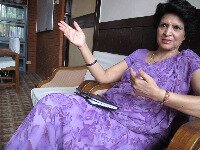From Nepal: `We build step by step’
 Dr. Sudha Sharma |
Part six of the 8-part series In the Driver’s Seat: A Series on Country Ownership of Health Programs. Dr. Sudha Sharma, Nepal’s Secretary of the Ministry of Health and Population and a gynecologist and public health specialist by training, spoke with John Donnelly in her office in Kathmandu earlier this month.
Q: What can Nepal’s experience in country ownership teach other countries?
A: We have just completed the development of Nepal’s health sector program for the next five years. The key elements are based on five principles of international partnership – country ownership, harmonization, alignment, management for results, and mutual accountability. The design itself was led by the Ministry of Health and Population, but included civil society, academia, professional bodies, councils, international NGOs, and our development partners. It was very much a participatory process, but the leadership came from the Ministry.
In Nepal, some of the donor partners pool their funds in a basket along with government contributions. Some of them do not, but they support the government in implementing the program. Whether you are a pool partner or not, everybody is mandated to follow this national strategy. We recently signed a Joint Financing Agreement with our partners.
We have a very well-established system of meeting with our donors and national counterparts – five meetings a year to plan the annual budget, review implementation process, and at the end, we have a final review. … We will try to assess whether the financial contribution gone into implementing the program has or hasn’t achieved goals.
Q: What’s the most important step in starting to get ownership of your programs?
A: I think you need to get lots of evidence from the community. In Nepal, we follow evidence-based planning. We pilot things and then we scale up. We learn from experience. We build step by step. We learn from the ground reality, conduct research, find out what works and what doesn’t work.
Q: Can you give an example in Nepal where country ownership has improved a delivery of a service?
A: Previously in Nepal we used to have vertical projects – family planning, antenatal care, malaria control, for instance. These kinds of projects used to be funded by the donors, and although implemented by the government, the government ownership was less. Most of the money came from the donors and they used to have their say in everything. The technical experts used to be international, who would be paid very high salary. There used to be so many projects with overlaps. But now with country ownership, the advantage is we don’t have projects. We have a program, which we scale up across the country. There is less duplication of work and because of that there is efficiency in use of resources.
Q: Donors want to take credit for things. How can you give donors credit when money is pooled?
A: If a donor contributed to a small project, the result would be small. Now they can take credit for the national program.
Q: Is there still a ways to go before you fully own your health programs?
A: Yes, there is. In fact, some of the things which we really need to build our capacity in is trying to develop leaders in terms of human resources. Some public health leaders might retire soon. We need to develop a second cadre of leadership now. You need to build up these new leaders so you can project your country’s need and not be intimidated by the donors. My slight worry is maybe we haven’t invested more in building that resource. Also donors have the tendency to say, you do not have capacity here and not have capacity there, so they want their own oversight, which may be detrimental if it does not contribute to strengthening national capacity.
We have to balance these kinds of risks, strengthen our governance, so that donors are confident they can trust their money here. For the government, we have to be able to tell them we are managing fine, we want your money, we want you – but at a certain distance, not directly overpowering us and weakening our national system.
We have had help from MLI (Ministerial Leadership Initiative for Global Health) in building capacity, but I think now a bigger scale effort is required. We need more professionals with formal qualifications in public health. We need much longer, sustained, and focused attention in building our capacity. MLI’s work is very valued, but that alone will not be enough to fill the gap.
In the Driver’s Seat: A Series on Country Ownership of Health Programs
Part 1: WHO's Chan: 'Some countries are angry'
Part 2: Shah: 'We want real outcomes in health'
Part 3: Ethiopia’s Tedros: No ownership, no scale
Part 4: Wisman: Donors need to `take a little risk’
Part 5: Omaswa from Uganda: `Donors want a controlling say’
Part 7: From Mali: `We have a lot of control now’
Keyword Search
MLI works with ministries of health to advance country ownership and leadership. This blog covers issues affecting the ministries and the people they serve.
Connect with Us
![]()
![]()
Categories
Blogs We Like
- Africa Can End Poverty
- Africa Governance Initiative
- Behind the Numbers
- CapacityPlus
- Center for Global Health R&D Policy Assessment
- Center for Global Development: Global Health Policy
- Center for Health Market Innovations
- Global Health
- Global Health Hub
- Global Health Impact
- The New Security Beat
- PAI Blog
- RH Reality Check
- Save the Children
- Transparency and Accountability Program
Contact Us
Please direct all inquiries to

Comments